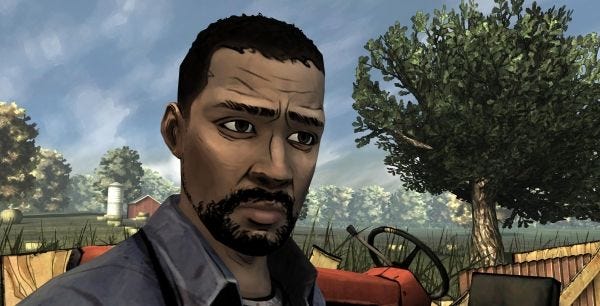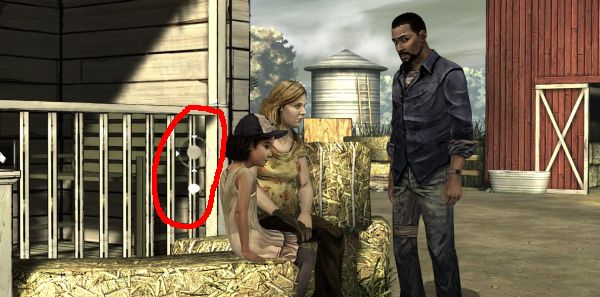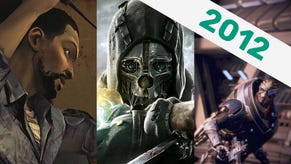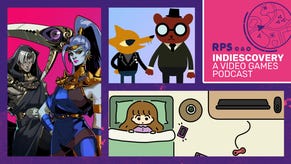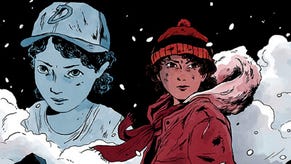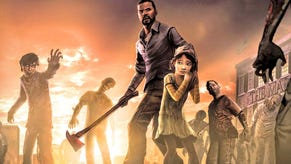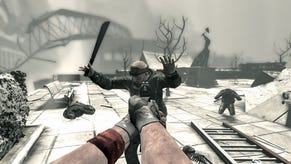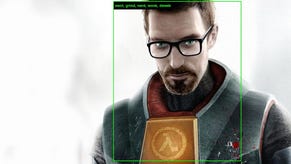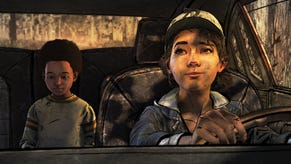Wot I Think: The Walking Dead Episode One
Chew on this
Telltale's first episode of their adaptation of The Walking Dead has a lot of work to do. After the terrible Jurassic Park provided an exclamation point at the end of a series of increasingly disappointing releases, reputations need rescuing here. So can the zombie thriller adventure redeem the adventure veterans? I've decided Wot I Think.
I'd argue people have had just about enough of zombies, so the burst of popularity for The Walking Dead as a comic and TV series was a bit of an oddity. In a world increasingly weary of yet more zombie franchises inhabited only by people who have somehow never seen any of the others, a bit more self-awareness or irony is usually demanded. But The Walking Dead comic's concept has barely stumbled forward from Romero's originals. The first series of Showtime's played out more like a tribute to the Living Dead series, lacking a single original notion of its own, at a painfully slow and repetitive pace. So it seems wise of Telltale to have started a parallel story in the same universe.
Instead, this is a story about a man who falls over a LOT. But an interesting man. Lee, your character, is a standard of zombie fiction, but not the one you'd normally expect to be playing. He was being escorted to prison in a police car when the outbreak began, and an amiable chat with the officer reveals that whatever it was you're jailed for, you likely did it. So you're the mysterious one you're not sure if you can trust. (Although it's worth noting it's a shame that a rare appearance of a black character as a protagonist should have to be a convicted felon.)
After the cop car crashes, you finally wake up sideways in the back seat, the policeman lying dead on the ground outside. Get out, and with no surprise at all he'll attack you. Then when dealt with things pretty speedily move you along to meeting your first gang of misfits with whom you'll try to survive, including a young child called Clementine.
Lee is a man of few words, which again makes for an interesting player character. It means, when given a selection of possible replies and a time limit to choose from them, you think a bit more carefully about what you want to say. Lee would. And a lot of those early choices are about how much you want to share - do you keep Lee extremely guarded, or open up about being a convicted criminal to others? The choices make a difference to how the game plays, how people react to you. And there are far bigger choices to make along the way, which seem like they'll be reflected in future episodes, as well as within this one.
And overall, this is a good story. Again, as with the majority of zombie fiction, it doesn't attempt to do anything original. It's a small group of survivors, each with their own quirks, trying to defend temporarily safe locations, while arguing with each other. But as is the point of the genre, it's not about the undead outside, but the nature of the humans still alive, and here it succeeds. Relationships, the danger of sharing too much in a tense situation, individual values, and the confusion of previous concerns in an utterly different world, all play out pretty well.
However, it does feel like about two-thirds of being a game. Far from being a tedious stream of quick-time events, thank goodness, interaction is still relatively limited.
Being adventure sorts, Telltale began with classic point and click interfaces, and then adapted them for their console and portable versions. But here the process has clearly happened in reverse, the game originally intended to be played with a controller, and then peculiarly reverse-engineered to work with the mouse and keyboard. The result is an oddly gloopy confusion, where WASD occasionally control your character in third person movement, and other times don't, while your mouse controls what's essentially an analogue cursor in soupy movements around the screen. Switch to a 360 controller, which the game elegantly lets you do - automatically changing the on-screen instructions accordingly - and you realise that your mouse has actually been emulating the restrictions of an analogue stick. Which is berserk.
It's not helping that hot spots are often arbitrary. Look at the right object, but not the right spot on it, and there's no recognition. Why isn't the whole object a hotspot? And it gets worse, with hotspots completely misplaced, hovering to the left of the thing they're related to. For example:
The art style is splendid, a Borderlands-esque rotoscoped style, evoking comic drawings in 3D models. But this is Telltale's engine stretched to its very limits, and it creaks heavily. Everything looks great, but I wonder if the zombies are a little too cartoonish. In the more horrific moments, they can end up looking comical. And the developer's old audio issues are back, the quality compressed so much to get a vast amount of dialogue into the game's total 450MB, that voices bubble and pop. Which is a huge shame since the actors are all very good. Most bizarrely, at one point early on a character's voice blips and then seemingly finishes a sentence in another voice, in German some other language. Take a look:
A bunch of bugs plagued as I played. One crash lost a bunch of progress, thanks to the extremely ungenerous chapter-based saves. And at one point I was being haunted by a pair of batteries, that mysteriously floated around the screen.
Talking of those batteries, the strangest moment in what's otherwise a really decent story comes when a reporter for a local radio station can't get a radio to work. It turns out it doesn't have batteries in - fine, sure, everyone makes mistakes. But then when you offer to find some, she replies, "Thanks, I wouldn't know what to look for." So mystified is she by the concept of batteries that she then puts them in back-to-front. The pathetic helpless girl moment really doesn't suit the character, nor the entire game, and just comes across as insulting to everyone involved.
But that is the exception to an otherwise well crafted plot. It gets properly dark in places, brutal choices with brutal consequences, and there are some really nice lines. It's extremely sweary, which feels a little at odds with Telltale's cartoonish bobble-head style, but completely appropriate for the occasion. Arguments are cruel, people are going to die, and it embraces the bleak near-hopelessness of the genre. And they don't avoid the weirdness of an adult man turning up with a small child who isn't his daughter.
It's a shame that it has the issues it does, because it's definitely well worth playing. The ending makes sure you'll want to pick up the next chapter, and I'm not sure it needs to achieve more than that, frankly. It definitely achieves that.
This is a big improvement for Telltale, and a game that I'd argue improves on its source material. If only Telltale would accept their ten year old engine needs scrapping and starting over, and would give the PC version the space it needs to have quality audio, then this could be another leap better. But buggy and creaking as it is, and certainly lacking in enough points of interaction, it remains a tale well told.
